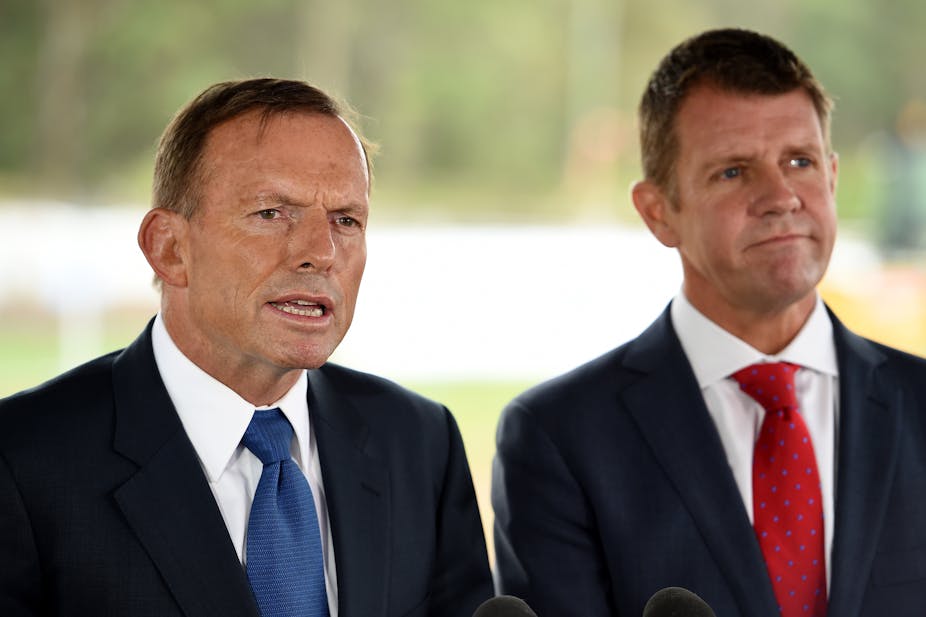The major political parties are only days away from launching their campaigns for this year’s New South Wales state election, to be held on March 28. As state political issues that don’t involve the Independent Commission Against Corruption (ICAC) often fall below the radar, the formal election period is a key event in NSW. It is one of the few times that state issues can get more than a sidebar on the front page of the daily newspapers.
As a result, Monday’s failed spill motion for the federal Liberal leadership came at just the right time for the NSW government. It is neatly out of the way just before the campaigning can begin in earnest. Unfortunately for the Baird government, the outcome wasn’t so serendipitous.
Much to the pleasure of the lacklustre NSW Labor Party, the “Abbott factor” is going to be part of the NSW election narrative. Unlike in Queensland, where the LNP’s Abbott-proof fence strategy succeeded in keeping the prime minister out of the sunshine state, NSW Premier Mike Baird will not be able to keep Abbott away.
This is due to three reasons. First, Abbott lives in NSW. Second, Abbott’s clock is ticking down. Having reportedly given himself a deadline of six months to demonstrate “Tony 2.0”, Abbott has to come out fighting. And campaigning is traditionally one of his great strengths.
Finally, Baird and Abbott have a good personal relationship with genuine shared policy interests upon which they can jointly campaign. These include the WestConnex motorway project, the second Sydney airport and, following the Martin Place siege, issues of terrorism and law and order.
While these policy concerns provide a basis to frame a narrative that positively draws Abbott into the election campaign, the negatives may still outweigh the positives. Monday’s Fairfax/Ipsos polling indicates that Abbott may be costing the NSW Coalition 8% of its voters. This is a sizable sacrifice to extend the career of a prime minister whose future remains uncertain.
However, the poll also suggests that a change of leadership would bring back only 34% of these defectors, demonstrating the limited bump the Coalition might have been able to engineer in its immediate levels of support through a potential shift to Malcolm Turnbull.
Regardless of whether we will nee a new leadership style and policy direction from Canberra in the next six weeks, some of the damage has already been done. Around 20% of Australian voters now cast pre-poll ballots, meaning there is less than six weeks to draw back the underwhelmed.
Importantly, it should be kept in mind that Labor is not going to win the NSW election. While the results in Victoria and Queensland demonstrate a political instability that needs serious consideration by the academic and political classes, NSW remains a special case. Disgust with the ALP’s tolerance of corruption and closed-shop politics remains in voters’ minds. Court cases drag on, which continue to stoke New South Welshmen’s collective ire.
Only last week, popular hate figure and former Labor MP Eddie Obeid was back on the front pages after having been forced to surrender his passport in anticipation of criminal prosecution.
Dissenting voters are likely to head to any number of minor parties that will be contesting the election. However, one of the likely magnets for disgruntled LNP voters, the Palmer United Party (PUP), will be absent. Party founder Clive Palmer neglected to register PUP in NSW. He’ll now likely be kicking himself, given the surprising 5% vote PUP achieved in the Queensland election. PUP would have been able to translate that into at least one Legislative Council quota.
The success of minor parties in the NSW upper house has been an enduring part of the story of NSW politics, much to the chagrin of state premiers.
The ALP will be eager to use its Barack Obama-inspired local organising model of campaigning after its great success in Victoria and Queensland. To motivate union members – who make up the core of volunteers needed for this strategy – the party will emphasise the state government’s federally encouraged asset sales policy.
Asset sales, regardless of attempts to dress it up in 99-year leases or as “asset recycling”, is a highly unpopular policy with voters. Similarly, the federal government’s potential resuscitation of industrial relations changes to further move away from collective bargaining is a strong driver for unionists.
The ALP does run the risk of over-egging the Abbott issue, however. NSW Labor sent out its first Abbott-themed election email at 2pm looking to micro-fundraise off the spill story. While the left love hating on Abbott a lot more than the mild figure of Baird, it cannot be sustained for a six-week campaign.
Focusing on the federal dimension will be tempting, though. It allows Labor to shy away from its core problem in NSW: a lack of cut-through by its new leader, Luke Foley.

